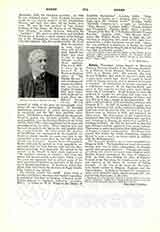

Ryken, THEODORE JAMES, known as BROTHER FRANCIS XAVIER, founder of the Xaverian Brothers, b. at Elshout, North Brabant, Holland, August 30, 1797; d. at Bruges, 1871. His parents, who were devout Catholics, died while he was yet a child, and a pious uncle reared him. Even in youth he loved works of charity and zeal, and at nineteen he became a catechist. At twenty-five he became secretary to a well-known convert, M. Le Sage-ten-Broek, and acted in that capacity for four years, until cholera broke out at Groningen. While helping to nurse the patients, he caught the infection, and came near to death. In 1826 he made a pilgrimage to Rome, and Leo XII gave him a medal in commemoration. He made a second visit in 1838, and had an audience with Gregory XVI. In 1827 he entered a Trappist monastery in Germany but, as his confessor told him that God had other designs for him, his stay was short. Ryken came to America in 1831, and remained for three years. His observations in the United States convinced him that Catholic teachers were needed, and, returning to Europe, he planned to establish a teaching institute. In 1837 he returned to America and obtained written approval from seven bishops. Thereupon he asked permission from Bishop Boussen, of Bruges, to found a congregation. The bishop consented, but, before the actual foundation, required Ryken to pass a year’s novitiate, which he fulfilled with the Redemptorists.
The Xaverian Brothers (q.v.) were established at Bruges in 1839. The beginning was hard, the founder having, with two or three companions, to struggle against disheartening obstacles. Courage and energy prevailed, and after a few years came brighter days. Brother Francis pronounced the vows of religion in 1846. In 1860, after holding the office of Superior General of the Xaverians for twenty-seven years, he was relieved of his duties on account of failing strength. At the time of his death the Xaverians were firmly settled in Belgium, England, and the United States. In Ryken’s character the conspicuous traits were optimistic faith, rigor towards self, and zeal for the observance of the rule.
BROTHER ISIDORE

